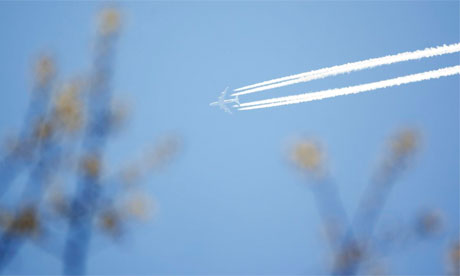
Does travel broaden the mind or narrow it, as some sceptics claim? It depends on the mind, of course. For many writers, travel elsewhere productively enhances their perspective on home. Flaubert possibly would not have written Madame Bovary had an Egyptian journey not refreshed his eye for the narrow minds of provincial France.
This week's poem, Descent, by Frances Williams, concentrates on arrival in Australia, and doesn't revisit the poet's native Wales. Nevertheless, Wales seems present in the psychic hinterland, the poem's tension partly informed by the experience of exchanging a small country for a vast continent.
Frances Williams is one of a lively younger generation of Welsh poets writing in English. Born in Bridgend in 1968, she has published three collections with Seren: Flotsam (1992), Wild Blue (2000) and The Red Rubber Ball of Happiness (2003). Descent is from Wild Blue: it also appears in the well-named dual-language anthology, Oxygen, edited by Amy Wack and Grahame Davies.
Williams trained as a sculptor, and her sharp visual imagination enlivens the poem. Looking down from the aircraft, the speaker observes both the horizon's broad curve and the minute curliness of the edges where beach and scrub entwine: she notes colours by analogy ("biscuit", "urine", "strong char"), and is alert to tricks of perspective. That tilting aerial view of the Earth is a thrill no amount of frequent flying entirely dispels, and the poem, with its slightly out-of-breath movement in short, energy-pumping sentences, captures the exhilaration. Similarly, defamiliarisation techniques jolt us into looking harder, reminding us of the so-called "Martian school" of the early 1980s, particularly Craig Raine's brilliant Flying to Belfast. Williams nicely observes some optical illusions the single-minded metaphorist might miss. "My cheese cracker is bigger/ Than Kangaroo Island. I measure the gap/ Between hand and mouth as Melbourne/ Fades to Adelaide." Later on, there is the arresting image of the "long white sun/ Which laces the window with its ice".
There are some metaphysical contortions. "Out through/ The bushy tail of history, my travels blow/ Sky high," is one example. This delivers a pun on the word "bushy" (as in the Bush) and perhaps a further pun on "tail". The landscape has become urban and the dream of wilderness evaporates, but why is history's tail the exit route?
Steadily nearing terra firma, the poem confronts the downside of what Elizabeth Bishop termed "questions of travel". The streets are "thin experiments in meaning"; the speaker's mother sounds a note of what might be self-serving caution. Her words recall Bishop's inner voice, hinting that it might have been better "to have stayed at home and thought of here."
The partly-internal rhyme ("you"/ "new") reinforces the point. There's a similar chime when "roar" is picked up in the end-rhyme of "carnivore", and "tight" by "bite". In fact, another Welsh echo in the poem is that of the verse-form cynghanedd, which translates literally as "harmony": as a metaphor, this is broadly suggestive of the poem's various overlapping effects, which are not only aural, as here, but visual and philosophical – wing and horizon, ocean and beach, future and past, the different time-zones.
The last couplet seems to be describing, rather obliquely, that moment when the plane has landed and must be slowed by a furious counter-thrust of energy. Again, it's an exhilarating moment, but a slightly scary one. This poem, like a good traveller, enjoys risk, including the technical risks of odd images and jump-cut rhythms. It's an upbeat poem, which says the "coming new" may not be all good, but certainly good enough. It makes me want to pack my bags and head off to the nearest airport, if just for that sensation of beating gravity and riding the winds into a bluer, clearer light (plastic meals, volcanic ash, baggage-handlers' strikes and eco-guilt notwithstanding).
Descent
The wing can hold the curve of the earth
Tucked like a pillow under its hard arm.
Australia is passing me her endless
Biscuit prairie, patch scrub trimming off
To curly beach. Peninsulas are sharp
As holly. And then a rash of salt lakes,
A strange pox, turquoise then urine.
At such altitudes, reassurance arrives
In the small white intimacy of plastic
Meals. My cheese cracker is bigger
Than Kangaroo Island. I measure the gap
Between hand and mouth as Melbourne
Fades to Adelaide. Between safety and
Danger, a continent surrenders its widest
Plan. Its dust is the colour of strong char.
Lower, and roads criss cross in grids, run
Straight and true, hold too fast to purpose,
Are thin experiments in meaning. Out through
The bushy tail of history, my travels blow
Sky high. Wherever you go, you're only
Ever you, my mother warned me. But
There again, perhaps she had an interest
In the retardation of the coming new.
The chord at my tail frays in wispy spray,
Slowly dissolves in the long white sun
Which laces the window with its ice.
At Perth the runway beckons as the future
Swiftly rises from the past. Local time
Greets me with a roar, my head held tight
In the playful bite of the world as carnivore.

